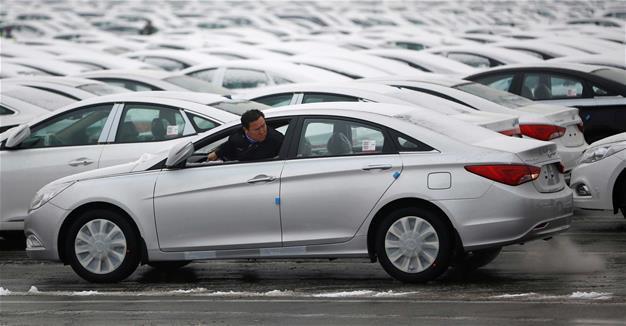Diplomatic spat casts long shadow over Hyundai factory town in China
BEIJING - Reuters
 In the industrial outskirts of Beijing, a local community in the shadow of a giant Hyundai Motor Co manufacturing complex is feeling the fallout from a fierce diplomatic standoff between China and South Korea.
In the industrial outskirts of Beijing, a local community in the shadow of a giant Hyundai Motor Co manufacturing complex is feeling the fallout from a fierce diplomatic standoff between China and South Korea.Workers said shifts at the cluster of Hyundai plants had been slashed as Hyundai struggles with plunging sales in China amid the year-long dispute. Suppliers, meanwhile, have been hit by falling orders.
Local entrepreneurs and officials said housing markets and businesses in the area, a suburban district in the northeast of the city called Migezhuang, had seen sharp drops in demand.
The slump for the mini-economies that have grown around the carmaker’s operations underscores how the hammering South Korean businesses have taken in China is affecting local interests too.
“Fewer people are coming to my store,” said Li Gonghe, who has been running a convenience shop in the area since 2004.
“If there were 50 people that came to my store before, now there are only five,” Li said. Hyundai workers “are getting too many days off and the whole village is paying for it.”
Hyundai’s four plants around China - three in the suburbs northeast of Beijing - halted production last week after a supplier refused to provide parts due to non-payment. Production was restarted on Wednesday, but not before rattling investors and weighing on Hyundai’s shares.
The South Korean carmaker has seen sales in China, the world’s largest auto market, tumble over 60 percent in recent months, in large part because of a chill between China and South Korea over Seoul’s deployment of a U.S. anti-missile system.
South Korea says the Terminal High Altitude Area Defense system is needed to counter threats from North Korea. China says it poses a threat to its national security.
Workers at the local plants, operated by a joint venture between Hyundai and BAIC Motor Corp Ltd, said shifts and overtime had been significantly cut, hitting salaries.
“In May, June and July, we only worked one week per month,” one worker, Liu Haipeng, said outside the gates of one factory. “We are having too many vacation days. Who knows what’s going to happen in future.”
He said workers at a nearby South Korean factory supplying to Hyundai had recently protested against the cuts.
Hyundai and BAIC declined to comment.
Hyundai cut production at its four factories in China earlier this year due to slumping sales. A fifth China factory was scheduled to start production in August.
Xu Xianlong, 52, another worker at the Beijing plants, said employees were often being put on temporary leave because of recent slow demand. Like Liu, he said that he now only worked one week each month, while his earning power had been cut by a quarter.
“Workers are on furlough too much,” he said. “I only worked one day in May. So I didn’t get any pay that month at all.”
Hyundai is not the only South Korean company feeling the heat in China. The South Korean conglomerate Lotte Group had around 90 of its Lotte Mart retail stores around the country closed over various safety violations earlier this year.
The closures, which came after Lotte approved a land swap deal with the South Korean government in February that enabled Seoul to deploy the missile defence system, are still in effect.
















